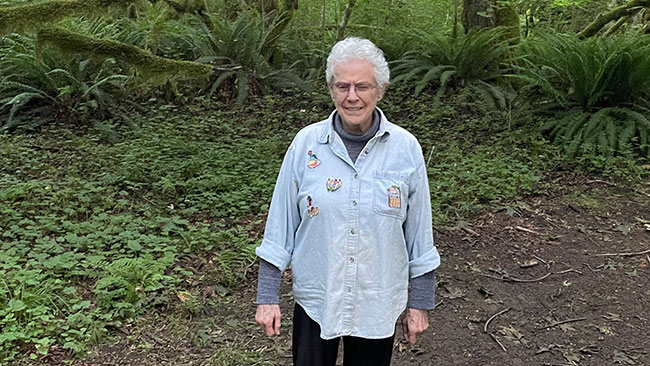From depression to connection: Older adult’s path to improved health
After a long period of loneliness, extreme fatigue, and isolation, Roberta Maguire gets the support she needs from Kaiser Permanente and her community.

Roberta Maguire enjoys taking walks in nature to stay active and healthy.
Roberta Maguire led a big, vibrant life — until it suddenly felt very small.
She began her career as a teacher in Chicago. She soon discovered a passion for the stage. She joined The Second City improv group in the 1970s and shared the spotlight with stars such as Bill Murray, John Belushi, and Harold Ramis.
She later made her way to Seattle, where she taught drama at Cornish College of the Arts. She also founded a successful improv group and was a guest lecturer at the University of Washington.
But in 1985, she started feeling unexplained extreme fatigue every day. She’d sleep until noon, and after being up for just a few hours, she’d have to lay down again. She had no energy for daily tasks, much less to keep up with her work.
“I lost everything,” she said. “I lost my job. I lost my relationships. I basically slept for the next 25 years.”
She experienced symptoms of what we now know as chronic fatigue syndrome.
When Maguire began experiencing symptoms, there was no name for the disorder and very little was known about it. In fact, the Centers for Disease Control and Prevention only started identifying it in 1988. The way it is diagnosed now was developed in 2015 by the Institutes of Medicine.
Maguire was also lonely and depressed. She often thought about suicide because she felt so hopeless.
Getting support for anxiety and depression
Through it all, Maguire persisted. She never learned exactly what led to her fatigue or what caused it to improve. But in 2010, she slowly started to regain her energy and mental focus.
She looked for ways to contribute to her community after feeling like she couldn’t for so many years. She joined a writers group and looked for opportunities to teach improv classes.
Now that she’s in her 80s, she’s concerned about the decline that can come with age. She doesn’t want to lose her vitality or the social connections she’s finally regained.
So, she sought help for anxiety and depression. According to a 2020 study by the Centers for Disease Control and Prevention, roughly 18% of adults in the U.S. have been diagnosed with depression at some time in their lives and 5% report regular feelings of depression.
Maguire began therapy with Angela Hudson, a mental health therapist for Kaiser Permanente.
Therapy helped her feel more like herself
Hudson uses cognitive behavioral therapy with her patients. This type of therapy, also called CBT, teaches people to notice thought patterns that may be contributing to problems in their lives. It can help them cope with challenges by thinking and acting in more helpful ways.
“CBT focuses on the way thoughts, feelings, and emotions influence our behaviors,” Hudson said. “We talked about reframing negative thoughts and implementing daily practices that help Roberta maintain her mental sharpness and her sense of joy.”
Outside of therapy, Maguire reads books and listens to lectures that encourage mindfulness. They help her focus on the present instead of worrying about the future.
We know that maintaining connection is essential, especially as we get older. Studies show that strong social bonds lead to improved health outcomes and extend lives. Angela Hudson, Kaiser Permanente mental health therapist
Healing with community support
Maguire found comfort and belonging by bonding with a family in her neighborhood. And she’s gotten support from the Village to Village Network. The network connects older adults with local, nonprofit, grassroots organizations called villages.
Villages enable older adults to stay in their homes as they age — and enjoy independent, healthy lives. They help older people find volunteers in their neighborhoods to provide transportation, light home maintenance, and technology coaching.
Villages also offer social activities and wellness activities. Building a supportive community helps older adults avoid social isolation.
“We know that maintaining connection is essential, especially as we get older,” Hudson said. “Studies show that strong social bonds lead to improved health outcomes and extend lives.”
Learn more about community-based programs and services in your area.
If you or someone you know is experiencing emotional distress, get help right away.
Signs to look out for
Older adults tend to have higher rates of suicide than other age groups. They’re affected by declines in physical and mental functioning and other factors often associated with getting older, such as bereavement, loneliness, and a lack of social connection.
Learn more about the warning signs of suicide.
Connect with a counselor if you feel lonely or need support
If you’re thinking about suicide, are worried about a friend or loved one, or would like emotional support, call or text the 988 Suicide & Crisis Lifeline. A chat option also is available at 988lifeline.org. You’ll be connected directly to a crisis-trained counselor. Support is available 24/7. It’s free and confidential.
Mental health emergency
If you or someone you know needs immediate emergency medical services for a mental health crisis, call 911 or go to the nearest emergency room.
How to get the mental health help you need
Learn more about mental health care at Kaiser Permanente.
Additional help and resources for mental health are also available.